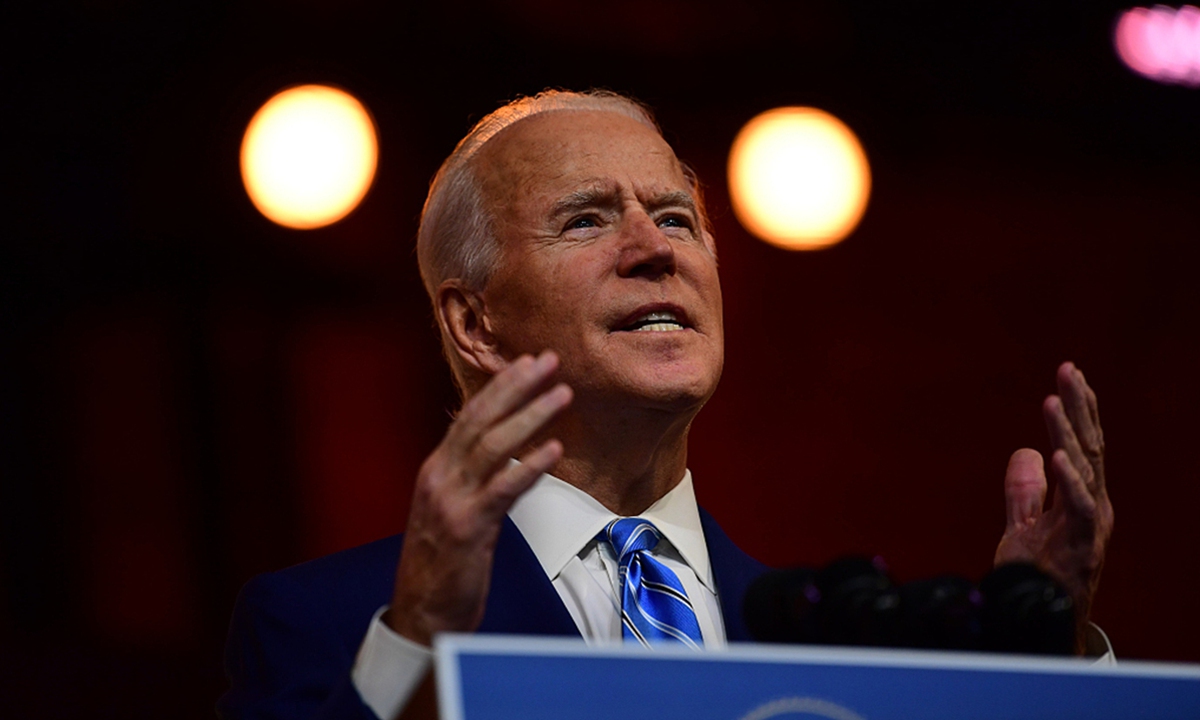Biden government will likely keep Aussies and allies from wild actions
By Xin Qiang Source: Global Times Published: 2020/12/6 21:53:40

Joe Biden. Photo: VCG
The current cartoon spat between Australia and China is taking a new turn. After Australian government reacted strongly to the tweet of a computer-generated image of an Australian soldier holding a knife to the throat of an Afghan boy, its friends, including the UK, France and New Zealand, came out to express support to Australia.
The incoming Joe Biden team, however, has taken a different approach. Jake Sullivan, appointed national security adviser for the Biden team, posted an even handed if veiled tweet on Thursday. It recognized that Australians, "have made great sacrifices to protect freedom and democracy around the world," and that the US will, "stand shoulder to shoulder with our ally Australia and rally fellow democracies to advance our shared security, prosperity, and values." Apart from him, no other senior official from the Biden camp has made any response to this case. However, we can never exclude the possibility that the Biden camp might show more support to Canberra, a long-term and steadfast ally of Washington, in the near future.
There are at least two probable reasons for present low profile of Biden's team. First, it has not officially taken office. Second, it is making a careful assessment of the current situation, likely seeing the broader picture with the key players there.
Indeed, Australian Prime Minister Scott Morrison's argument does not really make sense. Against the backdrop, there is no legitimate reason for Biden to back up Australia's condemnation against China. It already shows that Biden's team is more skilled, sophisticated and rational at handling foreign affairs. This is in glaring contrast to the Trump administration. It will not publicly take Canberra's side and simply rush blindly into what was clearly a PR fiasco for Morrison. It seeks decisive action.
No matter how US domestic attitudes over the incident may change, one thing is certain: Biden will enhance coordination and cooperation with US allies, including Australia. This is a fundamental change from Trump's neglect of US' alliances.
The future of US-Australia ties will, to a certain degree, depend on China-US ties. It can be certain that Australia will keep playing a crucial role in US strategies to safeguard its interests in the Asia-Pacific region. This will be the major foundation for the foreseeable future of relations between Washington and Canberra. Australia is a core member of the Five Eyes alliance, hence it will continue to dance to the American's tune consistently during the Biden presidency.
Against the background of China-US strategic game, US' policy for the next four years will continue to seek multilateral alliance frameworks to contain China. Many observers tend to believe that the Biden administration will to some extent ease tensions with China in the future. If so, Australia, the current anti-China pioneer, will very likely find itself in a predicament while laying bare its strategic misjudgments. If Biden adjusts US' China policy, this will force Canberra to reflect and change its previous calculations with Beijing.
When it comes to diplomacy, the most apparent difference between Biden and Trump administrations will be this: Biden won't take extreme, indiscriminate approaches. The US under Biden will go back to the normal track of ties with China where there will be both confrontation and cooperation - competitive coexistence. Unlike Trump's team with Pompeo, the Biden administration will not expect Australia to treat China in a radical manner with brinksmanship actions that undercut the economy of everyday Aussies.
Biden will surely hope US' allies, including Australia, to keep pace with the US in general and coordinate closely with US strategies.
But in the meanwhile, he will also hope for US allies to act within reason - particularly in the final days of the Trump administration. This does not mean the US will no longer enjoy seeing its allies confront China. As long as such frictions don't trigger military clashes and get the US into quagmires, tensions with China will be welcome to serve US interests.
That being said, Washington will largely want to keep such balance between China-US ties and US-Australia relations, however, it is never an easy job.
The author is deputy director of the Center for American Studies at Fudan University. opinion@globaltimes.com.cn
RELATED ARTICLES:
Posted in: VIEWPOINT